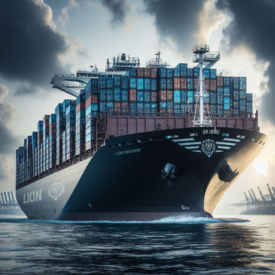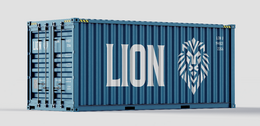Lusia Intermodal Ocean Network
This article is a work-in-progress because it is incomplete and pending further input from an author. Note: The contents of this article are not considered canonical and may be inaccurate. Please comment on this article's talk page to share your input, comments and questions. |
 | |
 | |
| Company type | Private |
|---|---|
| Industry | Shipping, air cargo, Rail transport |
| Founded | 1944 |
| Founder | Ricardinho Diamantina |
| Headquarters | , |
Area served | Worldwide |
Key people | Diego Aponte |
| Services | Container Shipping and Logistics |
| Revenue | |
Number of employees | |
| Subsidiaries | Lusia Intermodal Rail Access (LIRA) |
| Website | www.lion-exp.com |

Lusia Intermodal Ocean Network S.A., most commonly known by its acronym, LION, is a Cartadanian international shipping and logistics company headquartered in Beiramar, São Ricardo. Established in 1944 as the local Lusia Intermodal Company, handling cargo between the Lusia region and Urlazio, LION has grown to become the largest domestic shipping company in Cartadania, with 615 container vessels handling more than 3.2 million TEU on the global market. LION is one of the largest operators at its home port, the São Ricardo International Gateway, alongside O’Shea Container Shipping.
History
The inception of LION finds it roots in the endeavors of Ricardinho Diamantina, who, in 1944, laid the foundation for what would evolve into a logistical powerhouse—the Lusia Intermodal Company. Ricardinho Diamantina, with a foresight that was well beyond his time in Cartadania, embarked on a mission to establish a logistical entity that would not only cater to the local dynamics of the Lusia region but would also emerge as a formidable player on the global stage.
The establishment of the Lusia Intermodal Company marked a significant milestone in the evolution of cargo logistics in Cartadania. Under the stewardship of Diamantina, the company began its journey with a focus on facilitating cargo movements between the Lusia region and Urlazio. This strategic initiation laid the groundwork for a logistical enterprise that would grow exponentially in scale and influence over the ensuing decades. Diamantina's leadership played a pivotal role in steering LIC toward a trajectory of sustained growth and diversification. His commitment to excellence and an unwavering dedication to navigating the complexities of international logistics laid the groundwork for what would later become known as LION—a name synonymous with reliability, efficiency, and connectivity in the realm of cargo transportation that was expanding due to globalization.
The strategic foresight of key figures within LION facilitated a series of acquisitions and developments that diversified its operational portfolio. The acquisition of maritime assets solidified its standing as a maritime logistics giant, with the São Ricardo International Gateway emerging as a central hub. In parallel, Ricardinho Diamantina's successors steered LION into the realm of air cargo, with the establishment of LION Air in Alexandria, cementing its status as a comprehensive logistics entity.
The integration of advanced technologies into LION's operations during the late 20th century enhanced efficiency and responsiveness, streamlining much of the corporate operations and further reducing costs in a steadily inflating global economy. The company's commitment to innovation led to the establishment of an extensive global network, connecting six continents through its air cargo division. This technological infusion also positioned LION as a pioneer in sustainable logistics practices, aligning its operations with environmental stewardship.
In 1994, LION acquired Empire Rail along with all of its track rights, path agreements, and operational contracts, rebranding the company as LIRA, or the Lusia Intermodal Rail Access Corporation. Prior to the acquisition, LION contracted rail transport through various other carriers for long distance, express, and final mile distribution, costing the company several million per year in transfer requests and fees. LIRA allowed LION to continue reducing its operating expenditures, in turn, driving down the shipping costs companywide.
Sustainability
Services
LION Air
LION Air is the air cargo division of LION, headquartered in Escalia County, Alexandria. With a global network serving all six continents, it is among the largest scheduled all-cargo airlines in the world. LION Air maintains a substantial international presence, with 63 offices strategically positioned in over 39 countries. Each office functions as a logistical hub, ensuring the coordination of cargo movements and adherence to the overall standards of efficiency and reliability. The airline's international footprint is foundational to its robust and interconnected network, irrespective of geographical boundaries.
Portomar, where the hub is located has been a rapidly growing city within the state of Alexandria for several decades, and with its position just south of New Venceia and proximal to the IH-68 highway-rail corridor, allows LION to have a relatively seamless connecting point between its rail, sea, highway, and air modes.
LIRA

The Lusia Intermodal Rail Access (LIRA) is LION's rail division, handling mostly containerized cargo, but also carrying other forms of freight. In 2032, LION paid $10.23 million semi-annually for track access nationwide, a reduction of 21% from 2031 due to a set of federal transport subsidies aimed at expanding long-distance rail-based freight. As of 2032, LIRA is the second-largest rail cargo company in Cartadania, after the federally-owned Rail Logistics Cartadania (RLC).